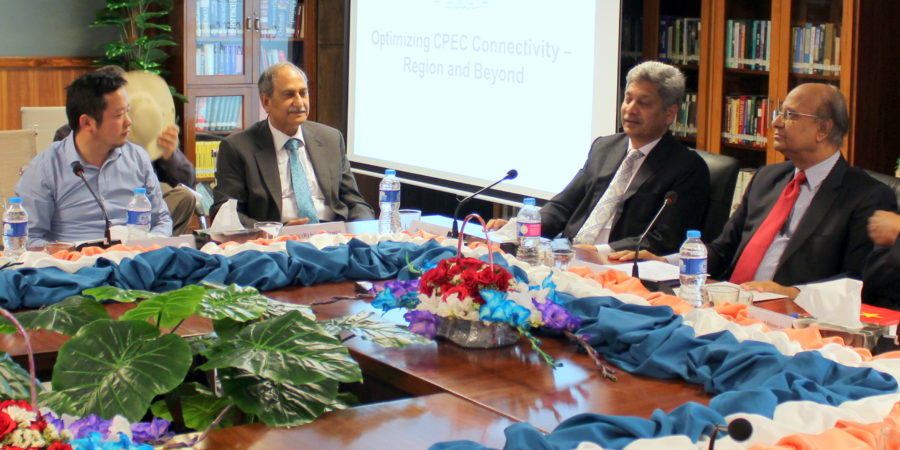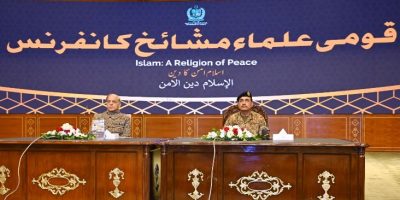Workshop on “Optimizing CPEC Connectivity – Region and Beyond”

Pakistan’s government machinery needs to develop its administrative capacities and ability to design, manage and reform infrastructure in order to benefit and make the China-Pakistan Economic Corridor (CPEC) a success. The federal and provincial governments should initiate large-scale outreach efforts towardsmitigating apprehensions of local communities in Balochistan and Gilgit-Baltistan. People in China and Pakistan should be helped in foreseeing gains from public and private investment and cooperation with each other and other countries.
These were some of the conclusions drawn by the keynote speakers and discussants of the one-day workshop on ‘Optimizing CPEC Connectivity – Region and Beyond’ organized by the
Islamabad Policy ResearchInstitute (IPRI) here in Islamabad, today.
Welcoming the participants to the workshop, Brig (R) SohailTirmizi, Director Administration at IPRI outlined how regional connectivity is not an end in itself rather a means to achieve the end of socioeconomic development. ‘The operationability of CPEC would not only transform bilateral economic relations between Pakistan and China, but will also develop intra-regional connectivity, promoting trade and development in South Asia.’ According to Brig. Tirmizi, Afghanistan will be the centre of CPEC-related activities, while the distance between China and Iran would reduce if the latter becomes part of CPEC connectivity. ‘Tehran would be able to access East Asia through lesser distance and at a reduced cost, especially given its proven energy reserves and being China’s largest trading partner.’
Dr Vaqar Ahmed, Deputy Executive Director at the Sustainable Development Policy Institute (SDPI), presented the work conducted by SDPI on ‘CPEC: Prospects for Promoting Intra-regional Connectivity in South Asia’ for which desk review of literature on OBOR, CPEC and ‘connectography’, as well as key informant interviews with policy scholars in China, India, Bangladesh and Sri Lanka, and focus group discussions were conducted. He stressed that economic corridors can be ‘game changers’ only if they offer not just intra-regional trade, but also investment, jobs, and people-to-people engagement that ensure peace in the region; and a key outcome of such corridors is an integrated network of infrastructures across regions and countries. ‘Any corridor’s socioeconomic rate of return hinges upon increased cross-border engagement between business communities. This is only possible if Pakistan makes a conscious effort to link both SAARC and the transport framework networks under the Central Asia Regional Economic Cooperation (CAREC) programme’, he stressed. There is a need for more imagination in implementing already signed agreements such as Quadrilateral Traffic in Transit Agreement (QTTA) because ‘timely implementation of this agreement can significantly benefit Pakistan in terms of reduction in the costs of trade with Central and South Asia.’ Dr Ahmed also highlighted that the Afghanistan Pakistan Transit Trade Agreement (APTTA) needs to be extended to other regional economies for which Afghan thought leaders have been actively interacting with those in Pakistan. He recommended that if there are any handshake moments between Pakistan and India at the forthcoming Shanghai Cooperation Organisation (SCO), Pakistan should demand that the SAARC Summit should be convened in Islamabad as soon as possible; and demand from India,access and linkages to the North South – East West Corridor planned under the National Highway Development Project in India. ‘This includes a highway from Srinagar to Kanyakumari (4000 km) and another highway from Silchar to Porbandar (3300 km). In return Pakistan should be willing to offer India transit for merchandise to select locations’, he advised. Dr Ahmed was of the view that intra-regional trade in SAARC region is not only less successful due to diplomatic tussles but also due to lack of expansion of exportable surplus in the region. He also said that the provincial governments in larger provinces, particularly Sindh and Punjab, will need to assure the smaller provinces that they will not be let down.
Ambassador (R) Syed Hasan Javed, Director, Chinese Study Centre of Excellence at NUST spoke on ‘CPEC: A Tool for Enhancing Inter-regional Connectivity with Central Asia and Russia’. He said that Western powers circulated maps of the New Silk Route for two decades without showing the ancient Silk Route through Pakistan (now CPEC), in deference to their love for India. China set the record straight in 2013 by declaring CPEC as the flagship project of One Belt One Road (OBOR). Unlike the United States’ revival of ancient Land Silk Routes and Maritime Silk Routes to connect Euro Asiatic Heartland for a Euro Asiatic Century, China wants to build a ‘global coalition of the winning, establishing a New World Order for global peace and development, balance and harmony.’ He opined that Pakistan was denied economic space by the West through multiple sanctions, quotas, duties etc. disabling the capacity of its economy to grow. But Pakistan has risen from those ashes and has become the ‘new epicentre of regional/global transformation – all roads lead to and from Pakistan’, he remarked. The Ambassador, however, warned that to implement the ‘CPEC Software’, comprehensive policy reforms are needed, especially making ‘One Window Facility’ available for foreign investors, particularly Chinese investors by establishing an ‘Integrated CPEC Authority of Civilian and Military Experts’ to undertake widespread policy consultation on CPEC mega projects. ‘CPEC should be studied by the best minds and expertise available in Pakistan. Lack of cohesion among major stakeholders, transparency and prevalence of confusion sends wrong signals’, he concluded.
Dr Nazir Hussain, Director, School of Politics and International Relations at Quaid-i-Azam University discussed the political and foreign policy aspects of CPEC connectivity with reference to the Middle East, especially Iran and Saudi Arabia. He shared that presently the Middle East is in turmoil and Iran, being in the centre having strong potential and backed by favourable regional and global security environment, is undoubtedly the rising power of the region. While Pak-Iran relations are marred by the Saudi factor, Pakistan’s Foreign Office needs to make more strenuous efforts to remain neutral in its relations with both countries. Besides other issues, competition between Chabahar and Gwadar, and the slow-moving progress on joint economic projects are issues that are hampering Pak-Iran bilateral relations. Pakistan has expressed its commitment to increase the existing bilateral trade volume of USD1 billion to USD5 billion over the next five years. Dr Hussain recommended that Pakistan needs to mend its broken fences with Iran, keeping in view the emerging strategic triangle between India, Iran and Russia. It is time for Pakistan to formulate a pragmatic policy vis-à-vis the changing strategic regional dynamics given China’s expanding relations with both South Asia and Iran, and expand its ties with Tehran to safeguard its national security interests.
Workshop Chair Dr AshfaqueHasan Khan, Dean, School of Social Sciences and Humanities from NUST pointed out that responsibility lies with the government to keep CPEC transparent and the business community of the country abreast with its developments. He reiterated the question raised by several speakers about the capacity of the bureaucracy to handle such a massive project. China’s prosperity is tied up with its neighbours’ prosperity – which can be achieved through connectivity, he stressed. Success of OBOR depends on CPEC. He further said that CPEC is a response to United States’ Asia Pivot Policy. China has now been transformed from a one-ocean country to two-ocean country like all other super powers. As Kashghar Development Zone will take time to develop, Pakistan has a lot of time to prepare itself for the benefits and opportunities that will be there for the taking. India is opposed to CPEC, not OBOR, because the former passes through Gilgit-Baltistan (which India claims to be its territory); and due to militarization of Gwadar, he remarked.
Dr Usman Mustafa, one of the workshop discussants from the Pakistan Institute of Development Economics (PIDE) called for designing high-potential, efficient, cost-effective and feasible policy solutions for CPEC implementation. Dr ZhangJiegen from Fudan University in Chinareminded participants that the OBOR initiative is the centre-piece of China’s economic diplomacy. ‘The essence of OBOR is to promote regional and cross-continental connectivity between China and Eurasia. It represents the first major attempt by China to design and implement a cross-continental trade strategy’, he said.Dr FarhanHanifSiddiqi,Associate Professor from Quaid-i-Azam University raised issues of concern regarding the tax concessions being offered to Chinese investors, environmental issues of coal-based power plants, and the problems of provincial consensus on CPEC as the major question marks.Dr Fazal-ur-Rahman from the National Defence University also indicated that China will protect its own political and economic interests and Pakistan also needs to carefully calculate the fiscal benefits being proposed under CPEC to the country. ‘Pakistan needs to do its homework and undertake analysis of its professional capacity and governance issues’, he remarked. While he was hopeful about Iran’s inclusion into CPEC, he was less optimistic about India’s role.Mr Khalid Mahmood, Consultant, CPEC & GREF at Pakistan Institute for Parliamentary Services (PIPS), was also one of the discussants.
Related News

Commuters hail ‘Erdogan’ underpass for easing traffic at F-8/F-9 junction
ISLAMABAD, Dec 10 (APP/DNA):Daily commuters have welcomed the grade-separation of the busy Jinnah Avenue–9th AvenueRead More

Pakistan cannot progress without eliminating terrorism, extremism, sectarianism: PM Shehbaz
Addressing the National Ulema Convention here, the prime minister urged religious scholars to play aRead More


Comments are Closed